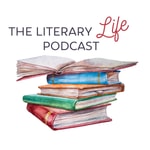The Literary Life Podcast – Details, episodes & analysis
Podcast details
Technical and general information from the podcast's RSS feed.

The Literary Life Podcast
Angelina Stanford Thomas Banks
Frequency: 1 episode/8d. Total Eps: 285

Recent rankings
Latest chart positions across Apple Podcasts and Spotify rankings.
Apple Podcasts
🇺🇸 USA - books
29/07/2025#16🇺🇸 USA - arts
29/07/2025#45🇺🇸 USA - books
28/07/2025#18🇺🇸 USA - arts
28/07/2025#58🇨🇦 Canada - books
27/07/2025#75🇬🇧 Great Britain - books
27/07/2025#66🇺🇸 USA - books
27/07/2025#19🇺🇸 USA - arts
27/07/2025#62🇬🇧 Great Britain - books
26/07/2025#43🇺🇸 USA - books
26/07/2025#19
Spotify
No recent rankings available
Shared links between episodes and podcasts
Links found in episode descriptions and other podcasts that share them.
See all- https://amzn.to/3KWMDi3
9 shares
- https://amzn.to/3uiLFTs
8 shares
- https://amzn.to/3RXC6pU
8 shares
- https://houseofhumaneletters.com/
262 shares
- https://cindyrollins.net
255 shares
- https://angelinastanford.com
64 shares
RSS feed quality and score
Technical evaluation of the podcast's RSS feed quality and structure.
See allScore global : 62%
Publication history
Monthly episode publishing history over the past years.
Episode 239: “Best of” Series – The Literary Life of Jone Rose, Ep. 135
Season 6 · Episode 239
mardi 27 août 2024 • Duration 01:29:04
Welcome to another remix episode of The Literary Life podcast with this popular “Literary Life of…” interview episode with Angelina, Cindy and their guest Jone Rose. Jone is a “super-fan” of the podcast and is a homeschool mom living in North Carolina. Today Angelina starts off the interview asking about Jone’s childhood reading life and school experience. Jone shares how her own adult literary education didn’t start until after she had been homeschooling her own children for several years. In addition to discussing the redemption of Jone’s own education, they talk about what Jone’s reading life looks like now, how narration helps make connections and increase understanding, asking better questions, and so much more!
To get see all the books and links mentioned in this episode, please view the full show notes on our website at https://www.theliterary.life/239.
Episode 238: Why Read Biographies
Season 6 · Episode 238
mardi 20 août 2024 • Duration 01:08:42
Welcome back to The Literary Life Podcast with Angelina Stanford, Thomas Banks, and Cindy Rollins. Thomas starts the conversation with some general thoughts on the biography as a branch of literature and as an art form. He also mentions some types of biography he does not care to read at all. Cindy brings up the tension between white-washing historical figures and dragging out every piece of their dirty laundry in biographical treatments. Angelina poses a question about the place of biographies in children's education.
To get a list of all the books mentioned and any other links mentioned in this episode, visit https://www.theliterary.life/238/.
Episode 229: “Best of” Series, “Araby” by James Joyce, Ep. 11
Season 6 · Episode 229
mardi 18 juin 2024 • Duration 01:36:17
This week on The Literary Life we return to the podcast vault for a re-airing of Episode 11, in which Cindy Rollins and Angelina Stanford enjoy a discussion of the short story “Araby” by James Joyce.
Delving into “Araby,” Angelina talks about the history and development of the short story form. Cindy gives a little of her own background with reading James Joyce and why she loves his short stories. Angelina and Cindy also discuss the essential “Irishness” of this story and all the tales in The Dubliners. Angelina walks us through the story, highlighting the kinds of questions and things we should look for when reading closely. Themes discussed in this story include: blindness and sight, light and darkness, romanticism, religious devotion, the search for truth, money, courtly love, and the knight’s quest.
If you want to find replays of the 2019 Back to School online conference referenced in this episode, you can purchase them in Cindy’s shop at MorningTimeforMoms.com.
Check out the schedule for the podcast’s summer episodes on our Upcoming Events page.
Commonplace Quotes:Whoever wants to become a Christian must first become a poet.
St. Porphyrios of KafsokalyviaA ritual for letting a son or daughter go free, handing them over under the protection of God, is not something that we naturally include as part of growing up today in the West. Yet we are here reminded of one of the most important steps of all of the transitions in life, moving from the confines of the family into freedom and maturity.
Esther de Waal Huxley Hallby John Betjemen
In the Garden City Cafe‚ with its murals on the wall
Before a talk on “Sex and Civics” I meditated on the Fall.
Deep depression settled on me under that electric glare
While outside the lightsome poplars flanked the rose-beds in the square.
While outside the carefree children sported in the summer haze
And released their inhibitions in a hundred different ways.
She who eats her greasy crumpets snugly in the inglenook
Of some birch-enshrouded homestead, dropping butter on her book
Can she know the deep depression of this bright, hygienic hell?
And her husband, stout free-thinker, can he share in it as well?
Not the folk-museum’s charting of man’s Progress out of slime
Can release me from the painful seeming accident of Time.
Barry smashes Shirley’s dolly, Shirley’s eyes are crossed with hate,
Comrades plot a Comrade’s downfall “in the interests of the State”.
Not my vegetarian dinner, not my lime-juice minus gin,
Quite can drown a faint conviction that we may be born in Sin.
To Pause on the Threshold by Esther de Waal
The Dubliners by James Joyce
Ulysses by James Joyce
A Portrait of the Artist as a Young Man by James Joyce
Angela’s Ashes by Frank McCourt
The Abbot by Sir Walter Scott
The Memoirs of Vidocq by Eugene Françios Vidocq
Support The Literary Life:Become a patron of The Literary Life podcast as part of the “Friends and Fellows Community” on Patreon, and get some amazing bonus content! Thanks for your support!
Connect with Us:You can find Angelina and Thomas at HouseofHumaneLetters.com, on Instagram @angelinastanford, and on Facebook at www.facebook.com/ANGStanford/
Find Cindy at morningtimeformoms.com, on Instagram @cindyordoamoris and on Facebook at www.facebook.com/CindyRollinsWriter. Check out Cindy’s own Patreon page also!
Follow The Literary Life on Instagram, and jump into our private Facebook group, The Literary Life Discussion Group, and let’s get the book talk going! http://bit.ly/literarylifeFB
Episode 139: “Hard Times” by Charles Dickens, Bk. 1, Ch. 1-10
Season 4 · Episode 139
mardi 6 septembre 2022 • Duration 01:48:17
On this week’s episode of The Literary Life, we begin our fall series on Charles Dickens’ Hard Times. Angelina, Cindy and Thomas start out the book chat by covering some of the differences between this book and other novels of his, as well as how to approach Dickens in general. They also discuss misrepresentations of Dickens as a social reformer, the allegorical and fairy tale elements of his works, and what keys to look for as you read through Hard Times. Thomas talks about Utilitarianism in educational reform, and Cindy highlights the ideas of Charlotte Mason in connection with Victorian times. Angelina brings out the references to imagination in these first chapters and the danger of distorting the child’s imagination.
Purchase the recordings of our 2022 Back to School Conference at MorningTimeforMoms.com. That is also where you can get signed up for Dawn Duran’s webinar on “A Reasoned Patriotism.”
You can also get the replay of Thomas’ webinar on Evelyn Waugh or register for Angelina’s mini-class on The Taming of the Shrew at houseofhumaneletters.com.
Commonplace Quotes:But already the Utilitarian citadel had been more heavily bombarded on the other side by and lonely and unlettered man of genius. The rise of Dickens is like the rising of a vast mob. This is not only because his tales are indeed as crowded and populous as towns: for truly it was not so much that Dickens appeared as that as hundred Dickens characters appeared.
G. K. Chesterton, from The Victorian Age in LiteratureThe first qualification for judging any piece of workmanship from a corkscrew to a cathedral is to know what it is–what it was intended to do and how it is meant to be used.
C. S. Lewis, from A Preface to Paradise LostNever be without a really good book on hand. If you find yourself sinking to a dull, commonplace level, with nothing particular to say, the reason is probably that you are not reading, and therefore, not thinking.
Charlotte Mason, as quoted by Essex Cholmondeley in The Story of Charlotte Mason from “Among School Children”by William Butler Yeats
Labour is blossoming or dancing where
The body is not bruised to pleasure soul,
Nor beauty born out of its own despair,
Nor blear-eyed wisdom out of midnight oil.
O chestnut tree, great rooted blossomer,
Are you the leaf, the blossom or the bole?
O body swayed to music, O brightening glance,
How can we know the dancer from the dance?
Cranford by Elizabeth Gaskell
The Life of Our Lord by Charles Dickens
A Child’s History of England by Charles Dickens
“Why Should Businessmen Read Great Literature?” by Vigen Guroian
“The Fantastic Imagination” by George MacDonald
Support The Literary Life:Become a patron of The Literary Life podcast as part of the “Friends and Fellows Community” on Patreon, and get some amazing bonus content! Thanks for your support!
Connect with Us:You can find Angelina and Thomas at HouseofHumaneLetters.com, on Instagram @angelinastanford, and on Facebook at https://www.facebook.com/ANGStanford/
Find Cindy at morningtimeformoms.com, on Instagram @cindyordoamoris and on Facebook at https://www.facebook.com/cindyrollins.net/. Check out Cindy’s own Patreon page also!
Follow The Literary Life on Instagram, and jump into our private Facebook group, The Literary Life Discussion Group, and let’s get the book talk going! http://bit.ly/literarylifeFB
Episode 138: In Search of the Austen Adaptation: Sense and Sensibility
Season 4 · Episode 138
mardi 2 août 2022 • Duration 01:49:10
Today on The Literary Life Podcast we bring you another fun episode in our “In Search of the Austen Adaptation” series. Hosts Angelina Stanford, Cindy Rollins and Thomas Banks are joined by resident film aficionado, Atlee Northmore to discuss film adaptations on Sense and Sensibility. The conversation opens by revisiting the question of what makes a good adaptation of a book when translating it for the screen. They talk about the challenges of showing modern audiences the characters and situations as Jane Austen meant them to be understood. Atlee gives a brief overview of the lesser known film adaptations, as well as a more in depth discussion of the 1995 and 2008 versions. You can access the PDF he created with links to watch here.
You are not too late to join in this year’s Back to School Online Conference! Go to MorningTimeforMoms.com to register and get in on the great talks, always live or later!
Commonplace Quotes:Sound principles that are old may easily be laid on the shelf and forgotten, unless in each successive generation a few industrious people can be found who will take the trouble to draw them forth from the storehouse.
Thomas Ruper, as quoted by Karen GlassHis senile fury was not exhausted by endless repetition.
Eric Linklater‘Remember, no one is made up of one fault, everyone is much greater than all his faults,’ and then she would add with a smile: ‘I find it much easier to put up with people’s faults than with their virtues!’
Charlotte Mason, as quoted by Essex CholmondeleyThe great abstract nouns of the classical English moralists are unblushingly and uncompromisingly used: good sense, courage, contentment, fortitude, some duty neglected, some failing indulged, impropriety, indelicacy, generous candor, blameable distrust, just humiliation, vanity, folly, ignorance, reason. These are the concepts by which Jane Austen grasps the world. In her we still breathe the air of the Rambler and Idler. All is hard, clear, definable; by some modern standards, even naïvely so. The hardness is, of course, for oneself, not for one’s neighbours. It reveals to Marianne her want ‘of kindness’ and shows Emma that her behaviour has been ‘unfeeling’. Contrasted with the world of modern fiction, Jane Austen’s is at once less soft and less cruel.
C. S. Lewis Selection from With a Guitar, To Janeby Percy Shelley
Ariel to Miranda:-- Take This slave of music, for the sake Of him who is the slave of thee; And teach it all the harmony In which thou canst, and only thou, Make the delighted spirit glow, Till joy denies itself again And, too intense, is turned to pain. For by permission and command Of thine own Prince Ferdinand, Poor Ariel sends this silent token Of more than ever can be spoken; Your guardian spirit, Ariel, who From life to life must still pursue Your happiness,-- for thus alone Can Ariel ever find his own. From Prospero's enchanted cell, As the mighty verses tell, To the throne of Naples he Lit you o'er the trackless sea, Flitting on, your prow before, Like a living meteor. When you die, the silent Moon In her interlunar swoon Is not sadder in her cell Than deserted Ariel. Book List:In Vital Harmony by Karen Glass
The Story of Charlotte Mason by Essex Cholmondeley
Robert the Bruce by Eric Linklater
C. S. Lewis’ Selected Literary Essays edited by Walter Hooper
Support The Literary Life:Become a patron of The Literary Life podcast as part of the “Friends and Fellows Community” on Patreon, and get some amazing bonus content! Thanks for your support!
Connect with Us:You can find Angelina and Thomas at HouseofHumaneLetters.com, on Instagram @angelinastanford, and on Facebook at https://www.facebook.com/ANGStanford/
Find Cindy at morningtimeformoms.com, on Instagram @cindyordoamoris and on Facebook at https://www.facebook.com/cindyrollins.net/. Check out Cindy’s own Patreon page also!
Follow The Literary Life on Instagram, and jump into our private Facebook group, The Literary Life Discussion Group, and let’s get the book talk going! http://bit.ly/literarylifeFB
Episode 137: Why Pastors Should Read Fiction
Season 4 · Episode 137
mardi 26 juillet 2022 • Duration 01:56:04
This week on The Literary Life podcast with Angelina Stanford, Cindy Rollins and Thomas Banks, we have a very special episode for you. Our hosts are joined by guests Dan Bunting and Anthony Dodgers, both of whom are pastors, for a discussion on why pastors should read fiction books. Dan is also host of the the Reading the Psalms podcast. Angelina starts off the conversation by asking why these men would prioritize taking literature classes. Anthony shares about his own literary life journey and how rediscovering literature has helped him personally. Dan talks about the book club that he and a couple of his pastor friends have and what kinds of books they read together. They discuss many other deep topics and crucial questions that we hope will be encouraging and thought-provoking to everyone who listens to and shares this episode.
Join us for the 2022 Back to School Conference, “Education: Myths and Legends” happening live online this August 1st-6th. Our special guest speakers will be Lynn Bruce and Caitlin Beauchamp, along with our hosts Cindy Rollins, Angelina Stanford and Thomas Banks. Learn more and register today at Morning Time for Moms.
Commonplace Quotes:If education is beaten by training, civilization dies.
C. S. Lewis, from “Our English Syllabus”How am I a hog and me both?
Flannery O’ConnorHe who has done his best for his own time has lived for all times.
Freidrich SchillerWhoever wants to become a Christian, must first become a poet.
St. Porphyrios of KafsokaliviaIt is hard to have patience with those Jeremiahs, in press or pulpit, who warn us that we are “relapsing into paganism”. It might be rather fun if we were. It would be pleasant to see some future Prime Minister trying to kill a large and lively milk-white bull in Westminster Hall. But we shan’t. What lurks behind such idle prophecies, if they are anything but careless language, is the false idea that the historical process allows mere reversal; that Europe can come out of Christianity “by the same door as in she went”, and find herself back where she was. It is not what happens. A post-Christian man is not a Pagan; you might as well think that a married woman recovers her virginity by divorce. The post-Christian is cut off from the Christian past, and therefore doubly from the Pagan past.
C. S. Lewis, from “De Descriptione Temporum” A Boy in Churchby Robert Graves
‘Gabble-gabble, . . . brethren, . . . gabble-gabble!’ My window frames forest and heather. I hardly hear the tuneful babble, Not knowing nor much caring whether The text is praise or exhortation, Prayer or thanksgiving, or damnation. Outside it blows wetter and wetter, The tossing trees never stay still. I shift my elbows to catch better The full round sweep of heathered hill. The tortured copse bends to and fro In silence like a shadow-show. The parson’s voice runs like a river Over smooth rocks, I like this church: The pews are staid, they never shiver, They never bend or sway or lurch. ‘Prayer,’ says the kind voice, ‘is a chain That draws down Grace from Heaven again.’ I add the hymns up, over and over, Until there’s not the least mistake. Seven-seventy-one. (Look! there’s a plover! It’s gone!) Who’s that Saint by the lake? The red light from his mantle passes Across the broad memorial brasses. It’s pleasant here for dreams and thinking, Lolling and letting reason nod, With ugly serious people linking Sad prayers to a forgiving God . . . . But a dumb blast sets the trees swaying With furious zeal like madmen praying.Put Out More Flags by Evelyn Waugh
Asterix Comics by René Goscinny
Tin Tin by Herge
Giants in the Earth by Ole Rolvaag
A Wrinkle in Time by Madeleine L’Engle
The Complete Stories by Flannery O’Connor
The Spy Who Came in from the Cold by John le Carré
The New Oxford Book of Christian Verse edited by Donald Davie
Waiting on the Word by Malcolm Guite
Word in the Wilderness by Malcolm Guite
Reflections on the Psalms by C. S. Lewis
Support The Literary Life:Become a patron of The Literary Life podcast as part of the “Friends and Fellows Community” on Patreon, and get some amazing bonus content! Thanks for your support!
Connect with Us:You can find Angelina and Thomas at HouseofHumaneLetters.com, on Instagram @angelinastanford, and on Facebook at https://www.facebook.com/ANGStanford/
Find Cindy at morningtimeformoms.com, on Instagram @cindyordoamoris and on Facebook at https://www.facebook.com/cindyrollins.net/. Check out Cindy’s own Patreon page also!
Follow The Literary Life on Instagram, and jump into our private Facebook group, The Literary Life Discussion Group, and let’s get the book talk going! http://bit.ly/literarylifeFB
Episode 136: Two for ’22 Reading Challenge Check-In
Season 4 · Episode 136
mardi 19 juillet 2022 • Duration 01:41:15
This week on The Literary Life podcast our hosts give an update on their progress with the “Two for ’22” Literary Life Reading Challenge. Angelina, Cindy and Thomas share their commonplace quotes, then begin going over each category and talking about their progress and the various books they have chosen so far. Scroll down in the show notes for all the book titles mentioned and affiliate links to them on Amazon.
Download the adult reading challenge PDF here, and the kids’ reading challenge PDF here. The Literary Life Commonplace Books published by Blue Sky Daisies are always available for purchase, as well!
Join us for the 2022 Back to School Conference, “Education: Myths and Legends” happening live online this August 1st-6th. Our special guest speakers will be Lynn Bruce and Caitlin Beauchamp, along with our hosts Cindy Rollins, Angelina Stanford and Thomas Banks. Learn more and register today at Morning Time for Moms.
Check out Episode 3: The Importance of the Detective Novel.
Commonplace Quotes:Nobody seems great to his dwarf.
Par LagerkvistWhat is true of nature is also true of freedom. The half-baked Rousseau-ism in which most of us have been brought up has given us a subconscious notion that the free act is the untrained act. But of course, freedom has nothing to do with the lack of training. We are not free to move until we have learned ot walk. We are not free to express ourselves musically until we have learned music. We are not capable of free thought unless we can think. Similarly, free speech cannot have anything to do with the mumbling and grousing of the ego. Free speech is cultivated and precise speech, which means that there are far too many people who are neither capable of it nor would know if they had lost it. A group of individuals who retain the power and desire of genuine communication is a society. An aggregate of egos is a mob.
Northrop FryeHe had had a choice, after all. The army had been keen to keep him, even with half his leg missing. Friends of friends had offered everything from management roles in the close protection industry to business partnerships, but the itch to detect, solve, and reimpose order on the moral universe could not be extinguished in him. He doubted it ever would be.
Robert Galbraith The Composerby W. H. Auden
All the others translate: the painter sketches A visible world to love or reject; Rummaging into his living, the poet fetches The images out that hurt and connect. From Life to Art by painstaking adaption Relying on us to cover the rift; Only your notes are pure contraption, Only your song is an absolute gift. Pour out your presence, O delight, cascading The falls of the knee and the weirs of the spine, Our climate of silence and doubt invading; You, alone, alone, O imaginary song, Are unable to say an existence is wrong, And pour out your forgiveness like a wine. Book List:The Dwarf by Par Lagerkvist
The Well-Tempered Critic by Northrop Frye
Formation of Character by Charlotte Mason
Anatomy of Criticism by Northrop Frye
Lethal White by Robert Galbraith
Poet’s Corner by John Lithgow
Rob Roy by Sir Walter Scott
The Wise Woman by George MacDonald
The Princess and the Goblin by George MacDonald
Paradise Lost by John Milton
The Wood Beyond the World by William Morris
Phantastes by George MacDonald
Ivanhoe by Sir Walter Scott
The Bride of Lammermoor by Sir Walter Scott
Evelina by Fanny Burney
The Boys by Ron and Clint Howard
The Most Reluctant Convert by David C. Downing
Dorothy L. Sayers by Colin Duriez
Dracula by Bram Stoker
Cranford by Elizabeth Gaskell
Silas Marner by George Eliot
Hard Times by Charles Dickens
David Copperfield by Charles Dickens
Wuthering Heights by Emily Brontë
An Old Man’s Love by Anthony Trollope
She Stoops to Conquer by Oliver Goldsmith
A Midsummer Night’s Dream by William Shakespeare
Two Gentlemen of Verona by William Shakespeare
Timon of Athens by Williams Shakespeare
The Trojan Women by Euripedes
Antigone by Sophocles
The Rehearsal by George Villiers
The Great Divorce by C. S. Lewis
Til We Have Faces by C. S. Lewis
The Medieval Mind of C. S. Lewis by Jason M. Baxter
The Oxford Inklings by Colin Duriez
Anxious People by Fredrik Backman
Enchanted April by Elizabeth von Arnim
The Shepherd’s Life by James Rebanks
Wintering by Katherine May
The Eternal Husband by Fyodor Dostoyevsky
The Aeneid by Virgil
A Daughter of Time by Josephine Tey
The Vision of the Anointed by Thomas Sowell
The Sun Does Shine by Anthony Ray Hinton
Jane Eyre by Charlotte Brontë
Notes from the Underground by Fyodor Dostoevsky
The Canterbury Tales by Geoffrey Chaucer
The Importance of Being Earnest by Oscar Wilde
The Golden Age of Murder by Martin Edwards
DC Smith Investigation Series by Peter Grainger
Nero Wolfe Series by Rex Stout
Simon Serrailler Series by Susan Hill
The Poisoned Chocolates Case by Anthony Berkeley
The Leavenworth Case by Anna Catherine Green
Trent’s Last Case by E. C. Bentley
Support The Literary Life:Become a patron of The Literary Life podcast as part of the “Friends and Fellows Community” on Patreon, and get some amazing bonus content! Thanks for your support!
Connect with Us:You can find Angelina and Thomas at HouseofHumaneLetters.com, on Instagram @angelinastanford, and on Facebook at https://www.facebook.com/ANGStanford/
Find Cindy at morningtimeformoms.com, on Instagram @cindyordoamoris and on Facebook at https://www.facebook.com/cindyrollins.net/. Check out Cindy’s own Patreon page also!
Follow The Literary Life on Instagram, and jump into our private Facebook group, The Literary Life Discussion Group, and let’s get the book talk going! http://bit.ly/literarylifeFB
Episode 135: The Literary Life of Jone Rose
Season 4 · Episode 135
mardi 12 juillet 2022 • Duration 01:29:00
Welcome back to this long awaited return of The Literary Life podcast and a new “Literary Life of…” interview episode with Angelina, Cindy and their guest Jone Rose. Jone is a “super-fan” of the podcast and is a homeschool mom living in North Carolina. Today Angelina starts off the interview asking about Jone’s childhood reading life and school experience. Jone shares how her own adult literary education didn’t start until after she had been homeschooling her own children for several years. In addition to discussing the redemption of Jone’s own education, they talk about what her reading life looks like now, how narration helps make connections and increase understanding, asking better questions, and so much more!
Join us for the 2022 Back to School Conference, “Education: Myths and Legends” happening live online this August 1st-6th. Our special guest speakers will be Lynn Bruce and Caitlin Beauchamp, along with our hosts Cindy Rollins, Angelina Stanford and Thomas Banks. Learn more and register today at Morning Time for Moms.
Commonplace Quotes:Surely this great writer would provide me with a definitive definition which showed me all the answers. He didn’t, and I was naive to expect him to. Generally, what is more important than getting watertight answers is learning to ask the right questions.
Madeleine L’EngleStories are able to help us to become more whole, to become named; and naming is one of the impulses behind all art, to give a name to the cosmos we see, despite all the chaos.
Madeleine L’EngleI am inclined to think that her work is in danger of being overlaid by too many interpreters and the simplicity of her message needs preserving.
Essex Cholmondeley from Ode: Intimations of Immortalityby William Wordsworth
Though nothing can bring back the hour Of splendour in the grass, of glory in the flower; We will grieve not, rather find Strength in what remains behind; In the primal sympathy Which having been must ever be; In the soothing thoughts that spring Out of human suffering; In the faith that looks through death, In years that bring the philosophic mind. Book List:Walking on Water by Madeleine L’Engle
What Is Art? by Leo Tolstoy
The Story of Charlotte Mason by Essex Cholmondeley
Brother Cadfael Series by Ellis Peters
The Voyage of the Dawn Treader by C. S. Lewis
The Magician’s Nephew by C. S. Lewis
Support The Literary Life:Become a patron of The Literary Life podcast as part of the “Friends and Fellows Community” on Patreon, and get some amazing bonus content! Thanks for your support!
Connect with Us:You can find Angelina and Thomas at HouseofHumaneLetters.com, on Instagram @angelinastanford, and on Facebook at https://www.facebook.com/ANGStanford/
Find Cindy at morningtimeformoms.com, on Instagram @cindyordoamoris and on Facebook at https://www.facebook.com/cindyrollins.net/. Check out Cindy’s own Patreon page also!
Follow The Literary Life on Instagram, and jump into our private Facebook group, The Literary Life Discussion Group, and let’s get the book talk going! http://bit.ly/literarylifeFB
Episode 134: “The Wind in the Willows” by Kenneth Grahame, Part 4
Season 4 · Episode 134
mardi 7 juin 2022 • Duration 01:14:31
In this week’s episode of The Literary Life, our hosts wrap up their series on The Wind in the Willows by Kenneth Grahame. Angelina, Thomas and Cindy talk about these final chapters of the book, covering some key ideas such as the siren song of the Sea Rat, Toad’s inability to see himself rightly, the echoes of Homer’s Odyssey, examples of bad discussion questions, and what makes this such a lasting book.
It’s not too late to join Cindy’s Summer Discipleship group! Head over the MorningTimeforMoms.com to register.
Thomas will be teaching an introductory course on Russian Literature in July 2022. Learn more and register at houseofhumaneletters.com.
Commonplace Quotes:Secrets had an immense attraction for him, because he never could keep one.
Kenneth GrahameIt is a reasonable hope that those who heard you in Oxford, many will understand henceforth that when the old poets made some virtue their theme, they were not teaching, but adoring, and that which we take for the didactic is often the enchanted.
C. S. LewisA childhood without books–that would be no childhood. That would be like being shut out from the enchanted place where you can go and find the rarest kind of joy.
Astrid Lindgren Mr. Toad’s Songby Kenneth Grahame
The world has held great Heroes,
As history-books have showed;
But never a name to go down to fame
Compared with that of Toad!
The clever men at Oxford
Know all that there is to be knowed.
But they none of them knew one half as much
As intelligent Mr. Toad!
The animals sat in the Ark and cried,
Their tears in torrents flowed.
Who was it said, ” There’s land ahead ” ?
Encouraging Mr. Toad!
The Army all saluted
As they marched along the road.
Was it the King? Or Kitchener?
No. It was Mr. Toad!
The Queen and her Ladies-in-waiting
Sat at the window and sewed.
She cried, ” Look! who’s that handsome man? “
They answered, ” Mr. Toad. “
Preface to Paradise Lost by C. S. Lewis
Pippi Longstocking by Astrid Lindgren
Seacrow Island by Astrid Lindgren
Wild Wood by Jan Needle (not a recommendation)
The Golden Age by Kenneth Grahame
Pagan Papers by Kenneth Grahame
Support The Literary Life:Become a patron of The Literary Life podcast as part of the “Friends and Fellows Community” on Patreon, and get some amazing bonus content! Thanks for your support!
Connect with Us:You can find Angelina and Thomas at HouseofHumaneLetters.com, on Instagram @angelinastanford, and on Facebook at https://www.facebook.com/ANGStanford/
Find Cindy at morningtimeformoms.com, on Instagram @cindyordoamoris and on Facebook at https://www.facebook.com/cindyrollins.net/. Check out Cindy’s own Patreon page also!
Follow The Literary Life on Instagram, and jump into our private Facebook group, The Literary Life Discussion Group, and let’s get the book talk going! http://bit.ly/literarylifeFB
Episode 133: “The Wind in the Willows” by Kenneth Grahame, Part 3
Season 4 · Episode 133
mardi 31 mai 2022 • Duration 01:20:39
On The Literary Life podcast this week, our hosts are joined in their discussion of The Wind in the Willows by Kelly Cumbee. Angelina, Cindy, Thomas and Kelly talk about chapters 7-8, focusing special attention on a section of this book that presents a potential problem for some readers. Angelina opens with background on the Enlightenment and Romanticism, the concept of “the Numinous,” and the popularity of the Pan character in Edwardian times. Thomas gives us a classical picture of who Pan was in mythology. Kelly then speaks to the Medieval understanding of the figure of Pan and the pastoral tradition along with their connections with Christ. They also address concerns over neo-paganism in relation to this book. If you want more discussion on mythology in literature, tune in to Episode 60: Why Read Pagan Myths.
Cindy’s 2022 Morning Time for Moms Summer Discipleship group is now open for registration. The theme this year is “Laughter and Lament.” Head over to morningtimeformoms.com to find out more and sign up!
Thomas will be teaching an introductory course on Russian Literature in July 2022. Learn more about his classes, as well as Kelly Cumbee’s classes, and register at houseofhumaneletters.com.
Commonplace Quotes:Dictionaries are like watches. The worst is better than none, and the best cannot be expected to go quite true.
Samuel Johnson“Here I am, sitting at a little oak table where in old times possibly some fair lady sat to pen, with much thought and many blushes, her ill-spelt love letter, and writing in my diary in shorthand all that has happened since I closed it last. It is the nineteenth century up-to-date with a vengeance. And yet, unless my senses deceive me, the old centuries had, and have, powers of their own which mere ‘modernity’ cannot kill.”
Bram StokerThis malady of unbelief, again, is common to serious minds, educated to examine all things before they know the things they criticise by the slow, sure process of assimilating ideas. If we would but receive it, we are not capable of examining that which we do not know; and knowledge is the result of a slow, involuntary process, impossible to a mind in the critical attitude. Let us who teach spend time in the endeavour to lay proper and abundant nutriment before the young, rather than in leading them to criticise and examine every morsel of knowledge that comes their way. Who could live if every mouthful of bodily food were held up on a fork for critical examination before it be eaten?
Charlotte MasonSuppose you were told that there was a tiger in the next room: you would know that you were in danger and would probably feel fear. But if you were told “There is a ghost in the next room,” and believed it, you would feel, indeed, what is often called fear, but of a different kind. It would not be based on the knowledge of danger, for no one is primarily afraid of what a ghost may do to him, but of the mere fact that it is a ghost. It is “uncanny” rather than dangerous, and the special kind of fear it excites may be called Dread. With the Uncanny one has reached the fringes of the Numinous. Now suppose that you were told simply “There is a might spirit in the room” and believed it. Your feelings would then be even less like the mere fear of danger: but the disturbance would be profound. You would feel wonder and a certain shrinking–described as awe, and the object which excites it is the Numinous.
C. S. Lewis To Find Godby Robert Herrick
Weigh me the fire; or canst thou find
A way to measure out the wind?
Distinguish all those floods that are
Mixed in that wat’ry theater,
And taste thou them as saltless there,
As in their channel first they were.
Tell me the people that do keep
Within the kingdoms of the deep;
Or fetch me back that cloud again,
Beshivered into seeds of rain.
Tell me the motes, dust, sands, and spears
Of corn, when summer shakes his ears;
Show me that world of stars, and whence
They noiseless spill their influence.
This if thou canst; then show me Him
That rides the glorious cherubim.
Dracula by Bram Stoker
Formation of Character by Charlotte Mason
The Problem of Pain by C. S. Lewis
Letters to Children by C. S. Lewis
The Great God Pan by Arthur Machen
Support The Literary Life:Become a patron of The Literary Life podcast as part of the “Friends and Fellows Community” on Patreon, and get some amazing bonus content! Thanks for your support!
Connect with Us:You can find Angelina and Thomas at HouseofHumaneLetters.com, on Instagram @angelinastanford, and on Facebook at https://www.facebook.com/ANGStanford/
Find Cindy at morningtimeformoms.com, on Instagram @cindyordoamoris and on Facebook at https://www.facebook.com/cindyrollins.net/. Check out Cindy’s own Patreon page also!
Follow The Literary Life on Instagram, and jump into our private Facebook group, The Literary Life Discussion Group, and let’s get the book talk going! http://bit.ly/literarylifeFB









